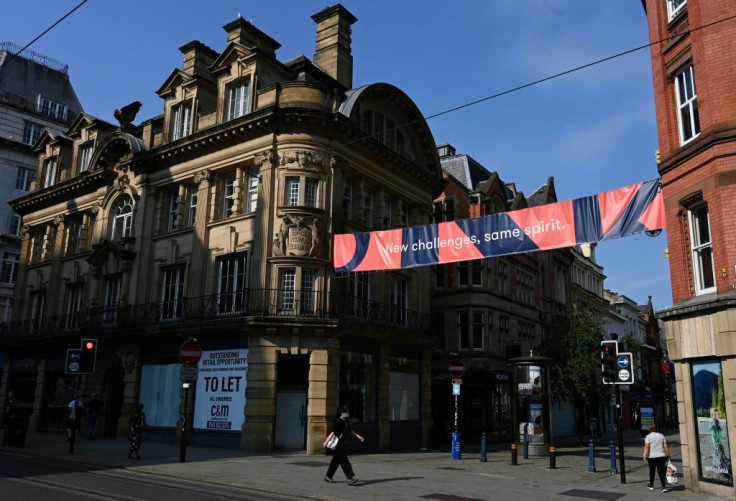Britain Enters Recession As GDP Plunged By Record 20.4% In Second Quarter

KEY POINTS
- This marks the first time the U.K. has entered a recession since 2009
- Britain’s second quarter GDP decline was twice as large as the contractions witnessed in Germany and the U.S
- Only in mid-June did businesses and shops in the U.K. start to reopen
Britain’s economy officially entered into a recession after government figures revealed on Wednesday that the gross domestic product tumbled by a record 20.4% in the second quarter, following a 2.2% contraction in the first quarter.
It marked the first time the U.K. has entered a recession since 2009.
Britain’s second quarter GDP decline was twice as large as the contractions witnessed in Germany and the U.S.
Economists usually define recession as two consecutive quarters of negative GDP growth.
In Britain, the COVID-19-related lockdown shut down tens of thousands of businesses, greatly hampering economic activity. As a result, household spending plunged, while factory and construction output also dropped.
The services sector, which accounts for four-fifths of the economy, endured the largest quarterly decline on record.
Only in mid-June did businesses and shops in the U.K. start to reopen.
“The economy began to bounce back in June with shops reopening, factories beginning to ramp up production and housebuilding continuing to recover,” said Jonathan Athow, deputy national statistician at the Office for National Statistics, or ONS. “Despite this, GDP in June still remains a sixth below its level in February, before the virus struck.”
Chancellor of the Exchequer Rishi Sunak told the BBC that the government is "grappling with something that is unprecedented" and that it is "a very difficult and uncertain time.”
However, Sunak’s Labour Party counterpart, Shadow Chancellor Of The Exchequer Anneliese Dodds put the blame squarely on Prime Minister Boris Johnson.
“[An economic] downturn was inevitable after lockdown -- but Johnson's jobs crisis wasn't," she said, referring to the fact that the U.K. has lost more than 700,000 jobs since March.
Dodds added: "We've already got the worst excess death rate in Europe -- now we're on course for the worst recession too. That's a tragedy for the British people and it's happened on Boris Johnson's watch."
Sunak warned BBC that government furlough and wage subsidy programs cannot run forever – they are currently set to expire in October == meaning more jobs will be lost in the coming weeks and months.
"I think most people would agree that that's not something that is sustainable indefinitely," he said.
Meanwhile, U.K. business advocates have urged the government for more stimulus support.
Alpesh Paleja, an economist at the Confederation of British Industry, said many companies are still struggling.
"A sustained recovery is by no means assured,” he stated. “The dual threats of a second wave [of COVID-19] and slow progress over Brexit negotiations are also particularly concerning."
Paleja also noted that business investment has been falling steadily. “The scale of the decline in business investment is staggering – it's now essentially back to levels seen in 1997,” he tweeted. “With so much uncertainty around the path of the pandemic, [it is] difficult to see a meaningful recovery anytime soon.”
The Institute of Directors, or IoD, a business organization, called the latest economic data “dire.”
“These dire figures highlight the painful reality households and businesses across the country are facing,” said Tej Parikh, chief economist at IoD. “The battle now is to prevent longer-term scarring from this coronavirus-induced plunge in economic activity. Job losses have been mounting and may only increase as we reach the end of the furlough scheme.
"The pile of debt businesses have had to take on could also cause a lasting hangover. With flimsy balance sheets, [company] directors will find it difficult to push ahead with any spending plans," he continued. "Meanwhile, sales and operations will remain limited by the need for social distancing and ongoing uncertainty around the virus.”
Parikh called on the government for new measures to support jobs.
“The Treasury should also explore options for restructuring business loans, while a targeted grant to help [small and medium-sized businesses] adjust to the new normal would bolster the government’s aim of reopening the economy,” he said.
© Copyright IBTimes 2025. All rights reserved.





















